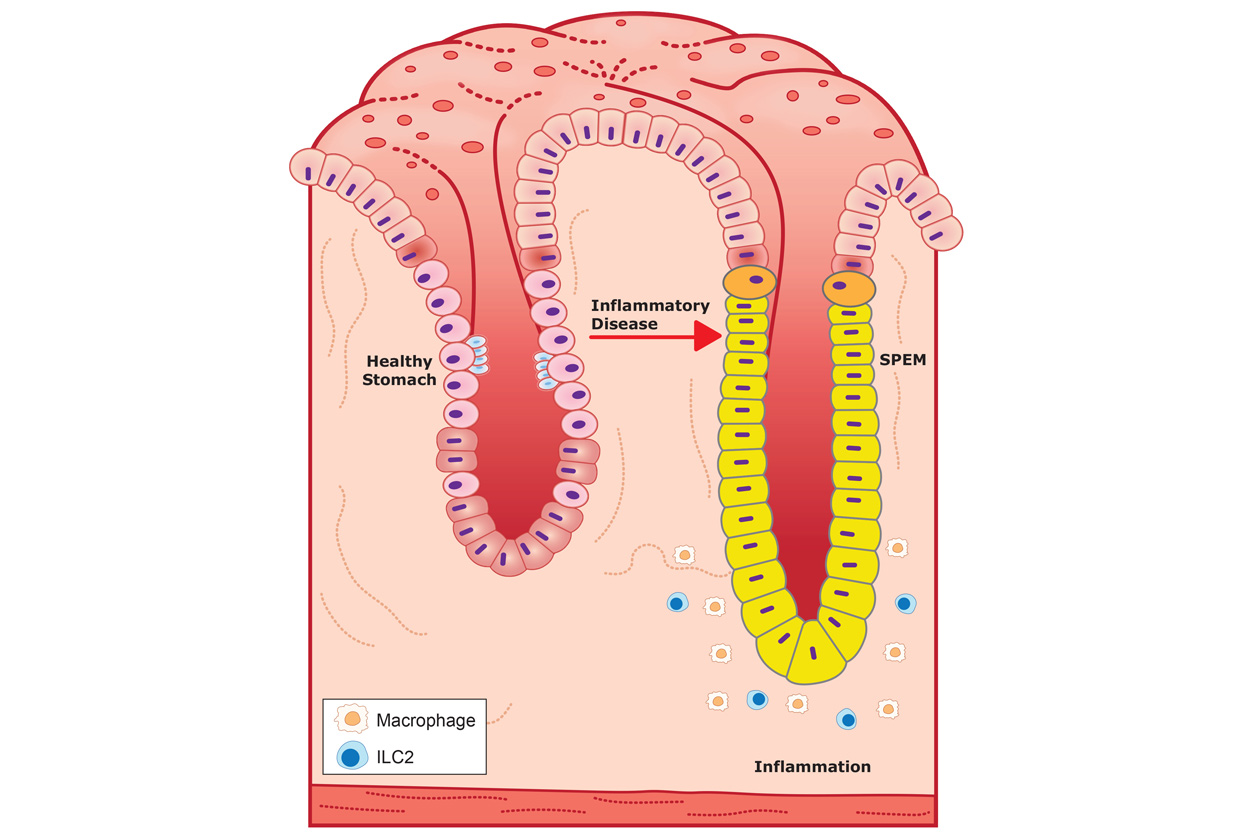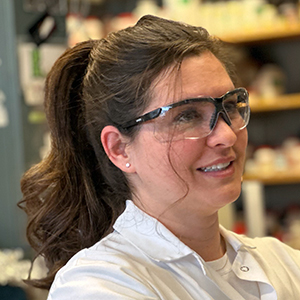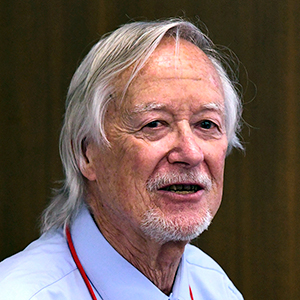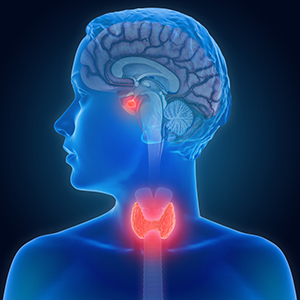 “Other than the skin, I can’t think of any tissue in humans and mice that’s more subject to multiple inflammatory attacks than the stomach,” Cidlowski said. (Photo courtesy of Steve McCaw / NIEHS)
“Other than the skin, I can’t think of any tissue in humans and mice that’s more subject to multiple inflammatory attacks than the stomach,” Cidlowski said. (Photo courtesy of Steve McCaw / NIEHS)After observing that androgens, or male sex hormones, play a critical role in preventing stomach inflammation, NIEHS scientists determined that such inflammation is regulated differently in male and female mice. The finding suggests that physicians could consider treating male patients with stomach inflammation differently than female patients with the same condition. The study was published in Gastroenterology.
NIEHS researchers made the discovery after removing adrenal glands from mice of both sexes. Adrenal glands produce glucocorticoids, hormones that have several functions, one of which is to suppress inflammation. With no glucocorticoids, the female mice soon developed stomach inflammation. The males did not. However, after removing androgens from the males, they exhibited the same stomach inflammation seen in the females.
'The fact that androgens are regulating inflammation is a novel idea,' said co-corresponding author John Cidlowski, Ph.D., deputy chief of the NIEHS Laboratory of Signal Transduction and head of the Molecular Endocrinology Group. 'Along with glucocorticoids, androgens offer a new way to control immune function in humans.'
Regulating inflammation
Although this study provides insight into how inflammation is regulated in males, Cidlowski said additional research is underway to understand the process in females. The scientist handling this phase of research is co-corresponding author Jonathan Busada, Ph.D. who is an assistant professor at West Virginia University School of Medicine in Morgantown. When Busada began to work on the project several years ago, he was a postdoctoral fellow working in Cidlowski’s group (see sidebar).
 “Since androgens act on and inhibit inflammatory cells, SPEM is more of a symptom of the dysregulated inflammation,” Busada said. (Photo courtesy of NIGMS / PRAT Program)
“Since androgens act on and inhibit inflammatory cells, SPEM is more of a symptom of the dysregulated inflammation,” Busada said. (Photo courtesy of NIGMS / PRAT Program)Whether inflammation is inside the stomach or elsewhere in the body, Busada said rates of chronic inflammatory and autoimmune diseases vary depending on sex. He said eight of 10 individuals with autoimmune disease are women, and his long-term goal is to figure out how glucocorticoids and androgens affect stomach cancer, which is induced by chronic inflammation.
The current research focuses on stomach glands called pits, which are embedded in the lining of the stomach.
Busada said the study showed that glucocorticoids and androgens act like brake pedals on the immune system and are essential for regulating stomach inflammation. In his analogy, glucocorticoids are the primary brakes and androgens are the emergency brakes.
'Females only have one layer of protection, so if you remove glucocorticoids, they develop stomach inflammation and a pre-cancerous condition in the stomach called spasmolytic polypeptide-expressing metaplasia [SPEM],' Busada said. 'Males have redundancy built in, so if something cuts the glucocorticoid brake line, it is okay, because the androgens can pick up the slack.'
Involvement of immune cells
The research also offered a possible mechanism — or biological process — behind this phenomenon.
 Glucocorticoids and androgens promote a healthy stomach pit by inhibiting inflammation, left, whereas their absence promotes inflammation and SPEM seen in a diseased pit, right. SPEM glands are also much larger than healthy stomach glands. (Image courtesy of Jonathan Busada / NIEHS)
Glucocorticoids and androgens promote a healthy stomach pit by inhibiting inflammation, left, whereas their absence promotes inflammation and SPEM seen in a diseased pit, right. SPEM glands are also much larger than healthy stomach glands. (Image courtesy of Jonathan Busada / NIEHS) In healthy stomach glands, the presence of glucocorticoids and androgens inhibit special immune cells called type 2 innate lymphoid cells (ILC2s). However, in diseased stomach glands, the hormones are missing. As a result, ILC2s may act like a fire alarm, directing other immune cells called macrophages to promote inflammation and damage gastric glands leading to SPEM, and ultimately, cancer.
'ILC2s seem to be the only immune cells that contain androgen receptors and could be a potential therapeutic target,' Cidlowski said.
Citation: Busada JT, Peterson KN, Khadka S, Xu X, Oakley RH, Cook DN, Cidlowski JA. 2021. Glucocorticoids and androgens protect from gastric metaplasia by suppressing group 2 innate lymphoid cell activation. Gastroenterology: doi: 10.1053/j.gastro.2021.04.075 [Online 7 May 2021].









